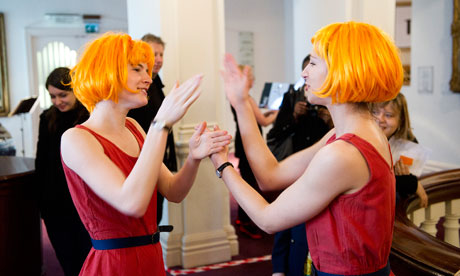
John Cage devised his first Musicircus in 1967, at the University of Illinois. In the spirit of the summer of love, it was a "happening" in which dozens of musicians and artists wandered amid a bustling audience, performing all at once. Since his death in 1992, the concept has been revived dozens of times, but it's hard to imagine any being as much fun as this one, which took place around three floors of bars, foyers and walkways of the ENO's Coliseum.
It's a very structured kind of anarchy. The assembled musicians – some static, some wandering – each have more than a dozen pieces of prepared music. They decide what, when and where to play by throwing dice or tossing coins. They may move among us, close enough for us to smell, gawp at and photograph, but they do not interact: instead, they perform like automata.
You almost take for granted the abundance of virtuosity standing inches from you. A woman in an usher's uniform will suddenly belt out a complex operatic aria. All around you are brass bands, choirs, avant-jazz ensembles, toy piano recitals. In one annexe sits Led Zeppelin's John Paul Jones, virtually unrecognised, playing a curious three-necked mandolin. There are weirder fringe attractions, too: chess grandmasters; a mycologist lecturing on fungi; two women in orange wigs playing clapping games.
Most of the time, the venue is a sonic Babel, with your brain trying to process two or more separate pieces of music at once. Occasionally, rhythms interlock, harmonies coincide, like a Charles Ives symphony, and the effect is sublime.
When Cage developed these ideas 50 years ago, they were part of his utopian desire to break down barriers and re-engage with music. Nowadays, for a multimedia age soaked in "free" music, the Musicircus takes upon a range of different meanings – perhaps less utopian, but no less challenging, and certainly no less entertaining.

